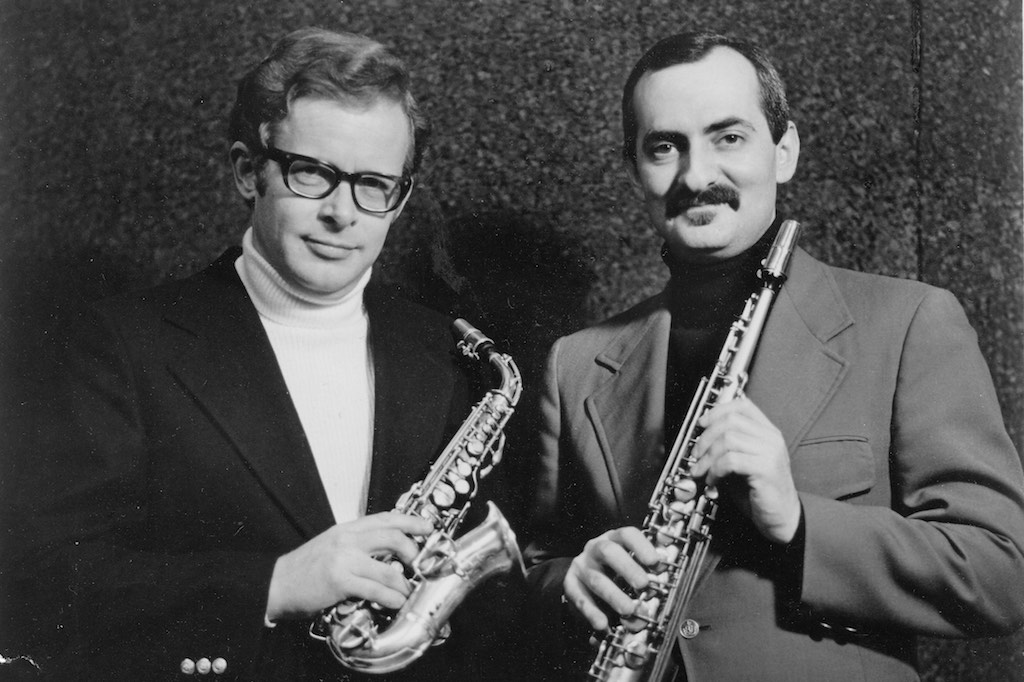WBGO..." Bob Wilber, saxophonist, clarinetist and bandleader who spearheaded a traditional jazz revival in the face of a postwar modernist boom, and kept the faith well into a new century, died on Aug. 4 in Chipping Campden, England. He was 91.
His death was confirmed by his wife, JoAnne “Pug” Horton, an English jazz and blues singer who was also his close musical collaborator for more than 40 years.
Wilber was revered among jazz traditionalists for his profound commitment to the idiom, his melodic flair as an improviser, and his singing, mellifluous tone — especially on soprano saxophone, the instrument favored by his teacher and mentor, Sidney Bechet. In a field that valorizes (and often carefully monitors) the authenticity of musical expression, Wilber’s early apprenticeship with Bechet, one of jazz’s first important soloists, always counted for more than a mere endorsement.
But Wilber was a precocious, persuasive talent by anyone’s standard: he was still a high school student, in Scarsdale, N.Y., when he formed a band called The Wildcats with peers like pianist Dick Wellstood. The Wildcats became a fixture at Jimmy Ryan’s, the Dixieland haunt on Manhattan’s fabled 52nd Street, and recorded a few 78s for Commodore Records; their version of “Willie the Weeper,” a 1920s standard, appears on a compilation called The Commodore Story.
“Wilber is amazing,” critic and historian Dan Morgenstern wrote in his notes for that 2-CD set. “He has absorbed Bechet’s vocabulary and speaks it fluently, and he plays with authority. Of all the revivalist players, these were the best — and they would soon leave mimicry behind.”
I'm also told he made some well regarded "play along" records for aspiring saxophonists...
BN.
His death was confirmed by his wife, JoAnne “Pug” Horton, an English jazz and blues singer who was also his close musical collaborator for more than 40 years.
Wilber was revered among jazz traditionalists for his profound commitment to the idiom, his melodic flair as an improviser, and his singing, mellifluous tone — especially on soprano saxophone, the instrument favored by his teacher and mentor, Sidney Bechet. In a field that valorizes (and often carefully monitors) the authenticity of musical expression, Wilber’s early apprenticeship with Bechet, one of jazz’s first important soloists, always counted for more than a mere endorsement.
But Wilber was a precocious, persuasive talent by anyone’s standard: he was still a high school student, in Scarsdale, N.Y., when he formed a band called The Wildcats with peers like pianist Dick Wellstood. The Wildcats became a fixture at Jimmy Ryan’s, the Dixieland haunt on Manhattan’s fabled 52nd Street, and recorded a few 78s for Commodore Records; their version of “Willie the Weeper,” a 1920s standard, appears on a compilation called The Commodore Story.
“Wilber is amazing,” critic and historian Dan Morgenstern wrote in his notes for that 2-CD set. “He has absorbed Bechet’s vocabulary and speaks it fluently, and he plays with authority. Of all the revivalist players, these were the best — and they would soon leave mimicry behind.”
I'm also told he made some well regarded "play along" records for aspiring saxophonists...
BN.


Comment